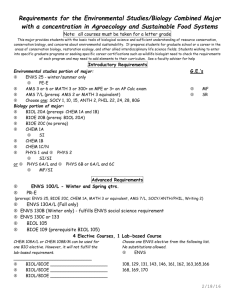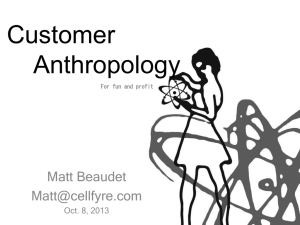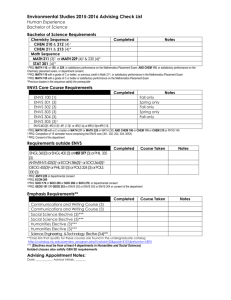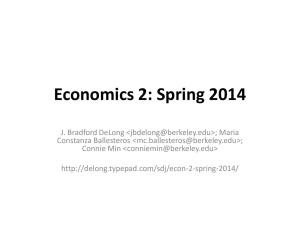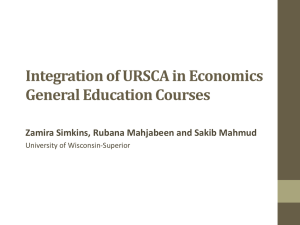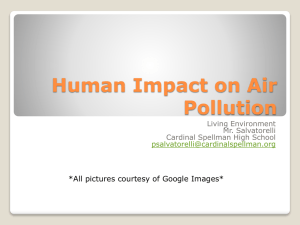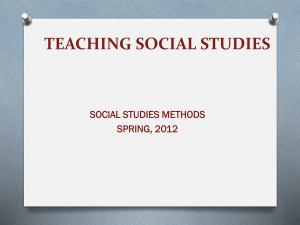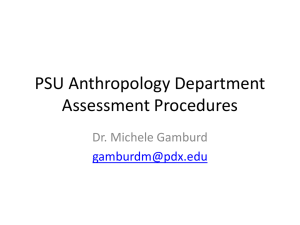Undergraduate Minor in Science, Engineering, Innovation, and
advertisement
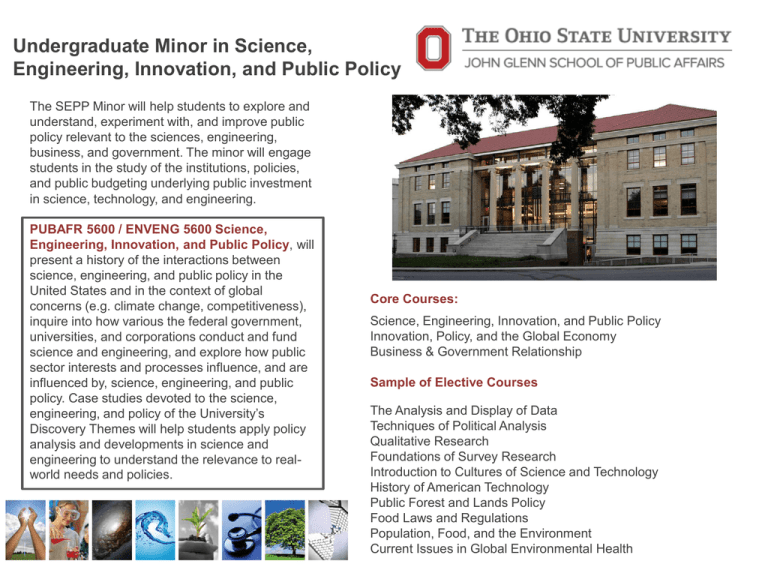
Undergraduate Minor in Science, Engineering, Innovation, and Public Policy The SEPP Minor will help students to explore and understand, experiment with, and improve public policy relevant to the sciences, engineering, business, and government. The minor will engage students in the study of the institutions, policies, and public budgeting underlying public investment in science, technology, and engineering. PUBAFR 5600 / ENVENG 5600 Science, Engineering, Innovation, and Public Policy, will present a history of the interactions between science, engineering, and public policy in the United States and in the context of global concerns (e.g. climate change, competitiveness), inquire into how various the federal government, universities, and corporations conduct and fund science and engineering, and explore how public sector interests and processes influence, and are influenced by, science, engineering, and public policy. Case studies devoted to the science, engineering, and policy of the University’s Discovery Themes will help students apply policy analysis and developments in science and engineering to understand the relevance to realworld needs and policies. Core Courses: Science, Engineering, Innovation, and Public Policy Innovation, Policy, and the Global Economy Business & Government Relationship Sample of Elective Courses The Analysis and Display of Data Techniques of Political Analysis Qualitative Research Foundations of Survey Research Introduction to Cultures of Science and Technology History of American Technology Public Forest and Lands Policy Food Laws and Regulations Population, Food, and the Environment Current Issues in Global Environmental Health Syracuse University – The Maxwell School of Citizenship and Public Affairs CTIP COURSES CTIP faculty teach the following courses on technology topics: PPA 730 Information Management in the Public Sector PPA 730 Networked Governance PPA 730 Government 2.0 PPA 772 Science, Technology and Public Policy PPA 776 Economics of Science and Technology PSC 755 Politics and Governance in the Information Age PPA 772 SCIENCE, TECHNOLOGY AND PUBLIC POLICY Discusses the interplay of science, technology and public policy. This course explores the relations of scientists and policymakers (knowledge and power). Technology is viewed as a resource that is both a tool of policy and a factor shaping policy. Moreover, various interests promote, oppose, and seek to control technology to "leverage" the future. Focus is on the United States, but attention is given also to other nations and their science and technology policies. A special concern is science, technology and environmental policy. University of Colorado, Boulder – Center for Science and Technology Policy Research Course Overview Graduate study provides you with an opportunity to gain expertise within a particular disciplinary or interdisciplinary specialty. Such expertise is essential to the processes of creating new knowledge and integrating existing knowledge to produce novel insights. But society looks increasingly to experts to do more than conduct research and produce knowledge -- society looks to experts to play a central role in securing the benefits of the nation’s investment in knowledge, while at the same time, helping to protect against the misuse or unintended consequences of science and technology. In short, society expects experts to contribute to decision making in public, private and civic settings. Science and technology result in a broad range of impacts on society. The impacts can be positive, such as the advances in health care over the twentieth century, or they can be negative, such as in the prospect of a disease escaping a lab and infecting millions of people. The impacts of science and technology on society depend on the decisions we make and decision processes we implement for the governance of science and technology. Given the central role played by science and technology in modern society it is critical to develop expertise at the interface of science, technology and decision making. Courses Offered by Center Faculty: ENVS 4800 Making Decisions in a Complicated World ENVS 5000 Policy, Science, and the Environment ENVS 5100 Science and Technology Policy ENVS 5110 Science, Technology, and Society (STS) Studies ENVS 5120 Quantitative Methods of Policy Analysis ENVS 5720 The Problem Orientation University of California, Berkeley – Center for Science, Technology, Medicine & Society Courses Offered 101 American Culture in the Atomic Age 84.2 Has Feminism Changed Science? Undergraduate Course Thread The undergraduate Course Thread on Sciences and Society begins with the understanding that the pressing problems of our time are simultaneously scientific and social, technological and political, ethical and economic. Beyond the confines of traditional disciplines–and in addition to the student’s major or minor–the Sciences and Society Course Thread helps Berkeley undergraduates investigate the complex relationships between these perspectives and practices, which are too often kept apart. It offers the opportunity to understand how science, technology, and medicine change our horizons of political possibility and social (in)justice. It also help us understand how social and ethical commitments, historical processes, and political formations help shape what will count as authoritative knowledge and viable technologies. The Course Thread on Sciences and Society was mentioned as exemplar of new model of undergrad education in the L&S Faculty Forum report on Re-imagining Undergraduate Education at Berkeley. 189 Bio-Power, Bio-Sociality, Bio-Design 119 Con(sequential) Geneologies of Difference: Anthropology and Genomics 119.1 Critical Bioethics 121 Theoretical Approaches in American Historical Archaeology 189 Anthropology of Science, Technology, and Medicine The Anthropology of Reason, Science, and Modernity The Archaeology of Health and Disease Anthropology of the Environment Energy, Culture, and Social Organization Introduction to Medical Anthropology The kinds of topics students will find in this Course Thread include the histories and futures of artificial intelligence and what it means to be human; race, identity, and genetics; the politics of access to medicines at home and globally; global environmental politics, social justice, and sustainable development; and much more. With courses in departments including Integrative Biology, Rhetoric, History, Environmental Science, Policy and Management, Ethnic Studies, Engineering, Geography, Anthropology, and many more, the Sciences and Society Course Thread helps Berkeley undergraduates develop new kinds of interdisciplinary literacy that are become increasingly important to our engagements in the contemporary world. Whose Science, Whose Fiction? Exploring America's Scientific Imagination Chicanos and Health Care Introduction to Urban and Regional Transportation Planning Carnegie Mellon University – Department of Engineering and Public Policy T&P Minor Curriculum Units 19-102 EPP Sophomore Seminar 3 19-451 (or 19-452) EPP Project 12 73-100 Principles of Economics 9 88-223 Decision Analysis & Decision Support Systems OR 88-302 Behavioral Decision Making 9 Two T&P Technical Electives 18 Minor in Technology and Policy For CMU students in Mellon College of Science, Humanities and Social Sciences, and the College of Fine Arts, EPP administers the Technology and Policy Minor. The T&P minor is designed to allow students to explore interests in the interactions of technology and policy without significant overload to the course requirements in their major curriculum. T&P Technical Electives include courses in that generally belong to two categories: courses which synthesize engineering analysis and social analysis perspectives and apply them to problems with substantial societal technological components; and courses which teach methods or background vital to classes of important problems at the technology-society interface. Specific areas of interest for these courses are The T&P Minor requires satisfactory completion of a set of six courses totaling to a minimum of 51 units. Courses taken for your major or other minor may be double-counted towards the T&P Minor. Note that some courses that qualify for the T&P minor are courses in engineering departments and may therefore involve prerequisites. • • • • • • • Energy, resources, and the environment Risk assessment Forensic engineering Urban engineering Information and communication technology Product engineering and design Robotics Michigan State University – James Madison College of Public Affairs Minor Requirements Science, Technology, Environment and Public Policy: Introduction to Science, Technology, the Environment and Public Policy History, Philosophy, and Sociology of Science Minor in Science, Technology, Environment and Public Policy The Minor in Science, Technology, Environment and Public Policy (STEPPS) is available as an elective to students who are enrolled in bachelor’s degree programs at Michigan State University. The minor will expose students to policy-making processes at the local, state, national and international levels; examine historical trends and analyze social relationships; build a strong understanding of scientific principles used to formulate sound policy initiatives; and facilitate a linkage between policy-making and science, technology and the environment. Course Description Introduction to Science, Technology, the Environment and Public Policy Relation of science and technology to ethics and public policy. Environmental law and public policy. Managing fish, water and wildlife resources at state, national, and international levels. Science and technology in developing countries. Impacts of military technology on environmental policy. Philosophy of Ecology American and European Health Care Since 1800 Environmental Reporting Topics in History, Philosophy, and Sociology of Science Technology and Culture Topics in History of Science Public Policy Public Policy Issues in the Agri-Food System Global Issues in Agriculture and Natural Resources Economics of Developing Countries Environmental Economics Law and Resources Forest Resource Economics Natural Resource Policy Conservation Ethics Socio-Economics of Conservation Biology Science, Technology and Public Policy The Philosophy of Technology

